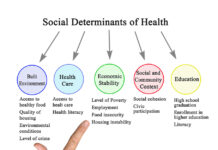EDITOR’S CORNER
Being poor and hungry makes life difficult for children: That plain, inarguable truth should be a starting point in any conversation exploring the mental health of youths facing hardship, whether individual or systemic. Is a kid not getting enough to eat? Is money tight, and are their parents stressed? Do they live in an impoverished or violent neighborhood? Are they affected, even injured, by racism? 
The need to ask such questions — all increasingly urgent — is underscored in a spate of new research, including three studies recently highlighted on the Mad in the Family page:
In one, Canadian researchers found links between food insecurity and mental-health diagnoses among children in Ontario. In another, out of George Mason University, the emotional wellbeing of Black teens in struggling neighborhoods was found to be negatively affected by structural inequities. And in a third, researchers at Heriot-Watt University in Edinburgh addressed the effect of living in poverty on children, parents, and family mental health.
None of which should be surprising, given the inevitable and enormous role played by social-environmental factors in anyone’s mental health, particularly kids and families scraping to get by. But in the biomedical narrative, such clear-as-day human truths are routinely ignored — and instead of being aided by social supports, children are diagnosed and, frequently, their parents are diminished or even blamed. If the impact of poverty on a family is recognized at all, it can be seen as a parental failing.
Imagine a different model, one that doesn’t demonize the poor and instead strives to lift them. Support them. Feed them, literally. And imagine the positive effect on mental health. Too often, voices for compassionate policymaking and institutional change are characterized by the moneyed and powerful as radical, airy-fairy idealists, but nothing is more rooted in realism than acknowledging the basic needs of children. They need to eat; they need a decent roof over their heads; they need to feel safe at home; they need parents who feel safe, too; they need to feel seen and heard, their emotions acknowledged without being medicalized.
Why is any of this so hard to comprehend? Because the structures currently in place — among them a mental healthcare system joined at the hip with Big Pharma — fail to make money off of any counter-narrative that emphasizes such fundamental needs as food and housing. Consider New York City mayor Eric Adams’ push to hospitalize unhoused people considered “mentally ill” — even those who pose no risk to themselves or others, and even when housing-first programs have been shown to provide greater chances for recovery.
In the firestorm that erupted after Adams announced the campaign, many noted the shortage of hospital beds in an overwhelmed, underfunded system that also tends to sedate and restrain more Black patients than white. Among all the objections, the focus on beds received the most attention: It was an observation based on raw numbers — capacity and cash — and it required no questioning of the current paradigm for care. Hospitalizing more people would require providing more beds, which, in turn, would cost more money. And as we all know in this society, the bottom line rules all.
Which, in a way, explains the brass-tacks reasoning in the Canadian study’s conclusions, which take a similarly pragmatic tack in calling for change. “Focused efforts to support food-insecure families could improve child and adolescent mental health,” the authors assert, “and reduce strain on the mental health system.”
So feeding poor children and supporting their families would make kids happier. It would be good for them, good for their parents. It would mean they’re less likely to struggle with their mental health and substance abuse — and less likely to get diagnosed and sucked into treatment.
In short, kids who aren’t hungry won’t overburden the system. And in the money-driven world we live in, that’s a logic that can’t be denied.
—Amy Biancolli, Family Editor
***
More from Mad in the Family
More Editor’s Corners















In the 1930’s the communists on the USA organised mass shoplifting. The state suppressed reporting of this. Perhaps this activity needs regiving? We could call it an example of ethical psychiatry.
Report comment